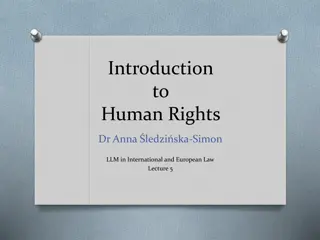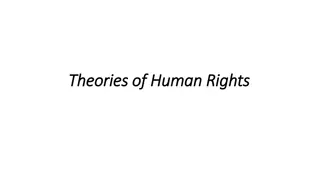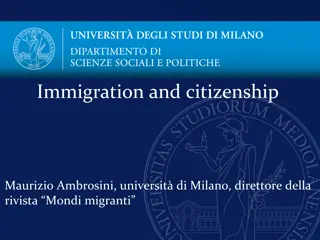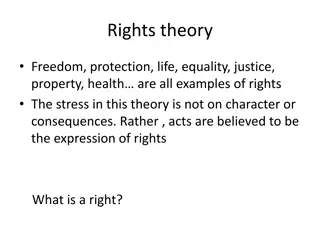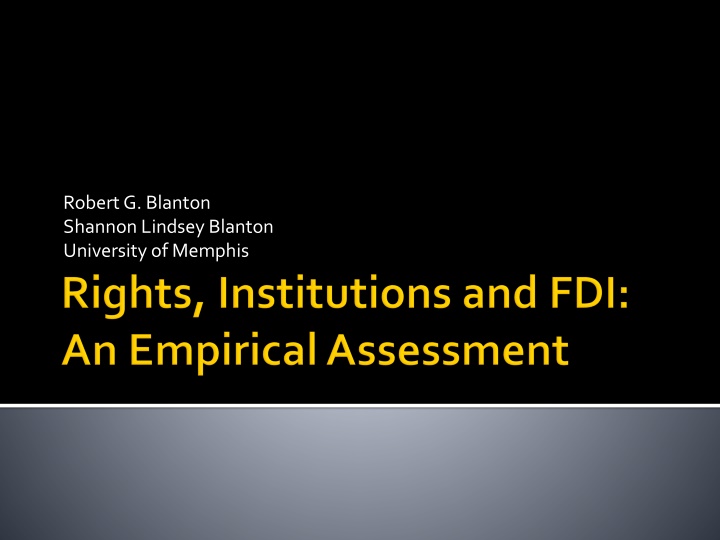
Influence of Rights and Institutions on FDI in Industrial Sectors
Explore how rights and institutions impact foreign direct investment (FDI) in various industrial sectors. Analyze the role of human rights, labor rights, education, and democratic governance in shaping FDI trends. Consider factors like skill level, dynamic inconsistency, and institutional guarantees. Discover the correlations between rights measures, institutional measures, and FDI stock across different sectors and leading host countries. Evaluate the significance of personal integrity, labor rights, human capital, and liberal policies in attracting FDI.
Download Presentation

Please find below an Image/Link to download the presentation.
The content on the website is provided AS IS for your information and personal use only. It may not be sold, licensed, or shared on other websites without obtaining consent from the author. If you encounter any issues during the download, it is possible that the publisher has removed the file from their server.
You are allowed to download the files provided on this website for personal or commercial use, subject to the condition that they are used lawfully. All files are the property of their respective owners.
The content on the website is provided AS IS for your information and personal use only. It may not be sold, licensed, or shared on other websites without obtaining consent from the author.
E N D
Presentation Transcript
Robert G. Blanton Shannon Lindsey Blanton University of Memphis
Examine role of rights and institutions in influencing FDI Human Rights personal integrity, labor rights, education Institutions BITs, FTAs, WTO, democratic governance Variance across industrial sectors
Rights spotlight effect more productive society Institutions reduce dynamic inconsistency problems visible commitment to liberal policies
Two key factors: Skill level linked with greater concern with rights Dynamic Inconsistency Risks greater need for institutional guarantees Sunk costs Mobility of capital
FDI data BEA FDI stock for 11 sectors, 1982-2007 Leading hosts of U.S. FDI 3 rights measures, 4 institutions measures Rights CIRI physical integrity and labor rights, human capital Institutions Polity, BITs, PTAs, WTO
Industrial Sector Skill Level D.I. Risk Petroleum Low High Mining Low High Food Manufacturing Low Low Industrial Machinery Manufacturing Electrical Manufacturing High Low High Low Transportation Manufacturing Fabricated Metal Manufacturing Chemical Manufacturing High Low Low Low High Low Wholesale Trade High High Services High High Finance High High
Pool observations Unit of analysis sector/country-year Dummy variable + interaction terms for key independent variables Base model (all sectors) Model 1 skill level dummy and interaction terms for rights and institutions variables Model 2 same for D.I. Population-averaged model
Variable: Total FDI Model 1 (Skill Dummy) Model 2 (D.I. Dummy) Personal Integrity Rights .006 (.004) .006 (.006) .011 (.005)** Labor Rights .021 (.015) .046 (.025)* .033 (.019)* Education .010 (.004)** .015 (.005)** .010 (.005)** Democracy -.006 (.002)** -.005 (.003)* -.008 (.003)** BIT -.046 (.028)* -.035 (.040) -.031 (.036) PTA -.004 (.032) .061 (.066) .017 (.033) WTO -.013 (.024) -.077 (.034)** -.056 (.033)*
Variable: Model 1 (interact w/skill dummy) .000 (.007) Model 2 (interact w/D.I. dummy) -.009 (.006) Personal Integrity Rights Labor Rights -.036 (.027) .005 (.025) Education -.007 (.007) -.004 (.006) Democracy -.001 (.003) -.002 (.007) BIT -.016 (.046) -.047 (.053) PTA -.073 (.074) -.026 (.059) WTO .099 (.038)** .069 (.036)*
Rights have a somewhat stronger impact than institutions Impact of skill rights still matter at lower skill levels contra labor dumping Dynamic inconsistency Rights more mobile capital responsive to rights Institutions Democracy, WTO
Democracy? Need to further assess sociopolitical determinants Need to account for diversity of FDI in analyses



